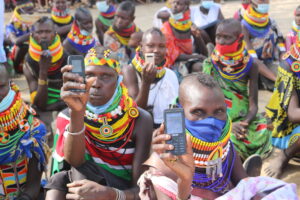This month BOMA kicked off direct implementation in Turkana County. Along with the establishment of a new field office in Lodwar, 1,680 new participants were enrolled in the graduation program. Although BOMA has worked in Turkana before, providing technical assistance to Mercy Corps in the USAID-funded Livestock Market Systems (LMS) project, this marks the first time BOMA is directly implementing its poverty graduation approach, known as the Rural Entrepreneur Access Program (REAP), in the region. Read more about the REAP model here.
REAP programming begins with the disbursement of an initial grant that helps kickstart the participants’ businesses and ensure their commitment to the program. Previously, the disbursement took place in person, with staff traveling to participant villages to hand over the cash directly. But this year, BOMA has shifted its grant disbursement to a remote system called Mpesa.

Newly enrolled participants wait to receive their grant on their new phones
Mpesa is a digital wallet that allows for easy access to payments and transfers. In Kenya, over 90 percent of the population owns a mobile phone, and 3G network reaches more than 83 percent of the country, meaning that even the most remote and vulnerable communities can have access to banking and mobile money.
How does it work?
When each new BOMA participant is enrolled, they receive a phone and SIM card registered to their personal ID number. BOMA then distributes the grant to each new phone number. The timing of the disbursement is coordinated with Mpesa agents, who act as in-person ATMs. As soon as the women receive the money on their new phone, they can take out the cash they need from these agents.

A participant receives her first transfer
Why do we use it?
Almost everyone in Kenya owns a phone, almost every establishment accepts Mpesa as a form of payment, and Mpesa agents allow those in rural areas to access cash quickly and easily. In the most remote areas, money transfers only take an average of eleven minutes from start to finish. This widespread accessibility, along with convenience and speed make mobile transfers the most effective and efficient payment method.
Using Mpesa also minimizes risk. Where previously BOMA staff traveled with large amounts of cash and were liable to theft or attack, digital transfers eliminate the possibility of asset loss or harm to staff.
Looking forward, looking back
As new participants began their journey on the path to resilience, recent graduates in Turkana reflected on their experiences with the graduation approach.
COVID-19 posed additional challenges for cohorts enrolled over the past two years, and although the complications of the pandemic delayed their exit, it also bred innovation. A business group running a duka in Turkana shifted to a barter system when customers became unable to pay with cash. They traded their stock for homemade brooms and wood. When the women sold these goods to wholesalers, they were able to make back what their customers owed.
Their business was so successful that they became the first women in their village to buy their own goats. Customarily, women in their community are not allowed to own livestock, but their newfound assets and successful business management skills earned the village’s respect. With their own resources, they had the freedom to challenge norms and to make important decisions for their household and their community. When asked whether they faced backlash for defying tradition, they said no, explaining, “Men respect empowered women.”

BOMA staff meeting with a graduated business group
Their success proves the potential of the graduation approach – even in the face of global challenges – and allows a promising glimpse into the future of the new October 2021 cohort.
